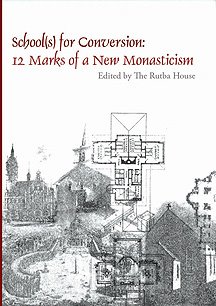
Last week, I was raving about this collection of essays, called together by the good folks at Rutba House, an intentional community living among the poor and serving together in incarnational, radical discipleship. They noticed that different kinds of folks are talking about community these days, and wanted to bring together various voices to ponder some common insights and principles. They invited some folks from the Emergent conversation, the Catholic Worker movement, Richard Foster’s Renovare ministry, which offered insights about the broad contemplative traditions that so many are reclaiming. The Christian Community Development Association (CCDA) founded by John Perkins reminded the gathered folk of their longstanding committment to the “3 R’s” (Relocation, Redistribution, Reconciliation.) My goodness, what a wonderful set of different traditions all insisting on community, work with the marginalized, prayerful attention to being church for the world. Here are the marks they came up with, which are explored wonderfully in School(s) for Conversion: 12 Marks of a New Monasticism.
Relocation to the abandoned places of Empire.
Sharing economic resources with fellow community members and the needy among us.
Hospitality to the stranger.
Lament for racial divisions within the church and our communities combined with the active pursuit of a just reconciliation.
Humble submission to Christ’s body, the church.
Intentional formation in the way of Christ and the rule of the community along the lines of the old novitiate.
Nurturing common life among members of intentional community.
Support for celibate singles alongside monogameous married couples and their children.
Geographical proximity to commuity members who share a common rule of life.
Care for the plot of God’s earth given to us along with support of our local economies.
Peacemaking in the midst of violence and conflict resolution within communities along the lines of Matthew 18.
The School(s) for Conversion chapters explore each of these, with different authors, of course, writing each one. There is a good degree of diversity, here, but they strive to offer this vision for those longing for a better form of living out fidelity in our times. I’ve noted some concerns I have, in my initial review of Shane’s book last week (he is one of the authors here) and also in my posting the other day about this book. Anyone else have any initial thoughts? I might suggest, though, that after weighing in, that many of us give this book a chance to perculate in our lives, that we prayerfully discern if we might be drawn to such steps towards similiar experiments. Is there someone (anyone?) you can talk to about these yearnings? Are you in some kind of small group, book club, fellowship or Sunday school class? I think this book–even if it miss certain features or asserts biases that some might not find essential—is one of the most important books of recent years. It is rare I say this, but, truly, there is nothing like it on the market! Thanks be to God that a book like this was put out, and let us hope it stirs up many to deeper consideration of the nature of our church life and the meaning of discipleship and spirituality and community and service.
For more info, visit www.newmonasticism.org. Then come back to Hearts & Minds and support our efforts to promote books that you most likely won’t find at your typical bookstore. Thanks.
School(s) for Conversion: 12 Marks for a New Monasticism Edited by The Rutba House (Cascade Books) $22.00
Hearts & Minds Books
More than a bookstore

I’m from an anabaptist background, and grew up with some of these values, and don’t disagree with them. However, since I’ve had a moderately to severely disabled son, I’ve found some of these paradigms just don’t make space for either me or him.
Julana,Thanks for this poignant comment. In my review I noted that this radical call to service and action needs to be understood in such a way as to include the aged and sick and those unable to live this way, or for those called into more traditional arenas of service. Yours is an important example.Still, I would think that the community leaders among any of the households represented in the New Mon movement would love to learn how to make room for you and your son, would be honored to have you among them, and would see themselves as that place (unlike perhaps more typical congregations) that can structure their lives together in such a way as to offer more tangible support and friendship with you and your son. Like L’Arche and Henri Nouwan’s loving stories of inclusive community with the disabled…This is an important concern for me (a former special ed major and summer camp counselor with Easter Seal) so I thank you so, so much for your comment. Where do you live now? How old is your son? How are you making out? Byron
Julana, You should check on L’Arche. I think you would be interested.